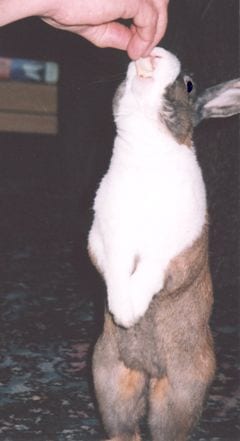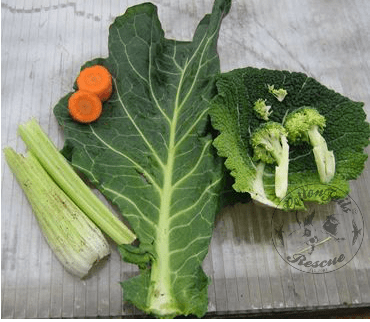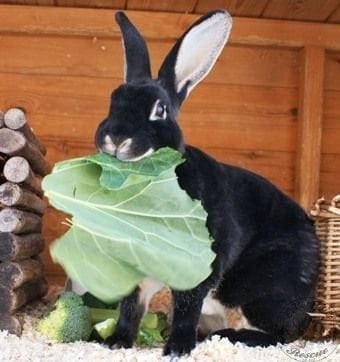FEEDING
Feeding your rabbit correctly is very important indeed. Let’s start with a short film about how to feed your rabbit:
You may also like to view the following video, which is actually very amusing as well as informative, and was made by the RSPCA:
Be consistent with the type of dry food given and stick to it. As a general guide, miniature breeds such as Netherland dwarfs should be fed half to one egg cup full each once a day. Medium breeds up to about 3kg should be given 1 egg cup (flat, not heaped) each once daily, and giant breeds given an increased amount accordingly. Handy measures can easy be obtained in supermarkets and are sold in packs of four brightly coloured measures, the smallest being ¼ cup (65mls) which is ideal for a single average sized rabbit, and the middle sized one being ½ cup (130mls) being ideal for a pair of average sized rabbits sharing a bowl. The rabbit will usually finish the food quickly and then will graze on green vegetables and hay for the rest of the day. Hay should comprise 70-80% of the total diet. Fruit should not be fed apart from an occasional treat, and carrots should be given sparingly if at all. More details on vegetables follows later.
Some domestic rabbits have a poor tolerance of vegetables, especially if under the age of 16 weeks, so proceed with caution otherwise severe diarrhoea may occur with fatal results. Start by offering tiny amounts of a variety of vegetables such as celery every other day and gradually build up the amounts over a period of weeks. Stop immediately if the rabbit has a dirty bottom or runny droppings, often resolved by withdrawing the fresh food. Seek veterinary advice if this is a persistent problem. Also see section below about this issue. Never feed lettuce to a rabbit of any age.
Rabbits should not be fed extras such as bread, toast, cake, sweets, biscuits, crisps etc. Treats, as shown in the photo above, can be given if the rabbit enjoys it but they need to be in the form of food that they would have been given anyway, such as little pieces of vegetables, or some pieces taken out of their daily dried food quota.
Refill the water bottle daily, and add large handfuls of fresh hay. It is essential for rabbits to have large quantities of fibre in their diet each day so ensure that your rabbits have access to fresh hay every day of the year. Examples of fresh food you can give your rabbit are: celery, cabbage, cucumber (small amounts), cauliflower leaves, spring greens, broccoli, carrot (very small amounts), brambles (blackberries) fruit and leaves, groundsel, mint, parsley, raspberry leaves. The following can be given in very small quantities as an occasional special treat: apple, dandelions, melon, peach, pear, pineapple, strawberries, banana. The photo below is an example of what vegetables I feed to a pair of rabbits every day.
Poisonous Plants – there is a very long list of plants that can be toxic to rabbits, and I have included the commonest ones (in the UK) here: all plants that grow from bulbs; amaryllis; arum lily (cuckoo point); bindweed (convolvulus); bracken; byrony; buttercup (small amounts dried in hay is ok); deadly nightshade (belladonna); delphinium (larkspur); elder; fools parsley; foxglove; hellebores (christmas rose); hemlock; henbane; lily of the valley; lupin; laburnum; most evergreens; oak leaves; poppies; potato tops; privet; ragwort; rhubarb leaves; scarlet runner; toadflax; woody nightshade; yew.
It is important with any rabbit, especially young ones, that you make any changes very slowly. If you do not know what your rabbit has been given in the past as far as vegetables are concerned, it is best to start with something safe like celery. Offer about a quarter of a stick once a day for a few days, and if there are no soft droppings as a result you can then introduce a piece of spring greens as well for another few days. Assuming that all is well you can then add a small piece of broccoli and so on until after a couple of weeks the rabbit is having a selection of green vegetables every day.
With young rabbits you need to avoid fruit completely, and only give a very small slice of carrot per rabbit as it is high in sugar and often gives soft droppings. The large majority of rabbits benefit from having green vegetables daily, but there some individuals that cannot tolerate this and therefore you are always best to proceed slowly.



